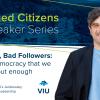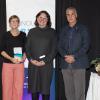MaryDawn MacWatt, a VIU Bachelor of Education student, led sharing circle discussions at a conference hosted by VIU Cowichan Campus last month. The conference explored issues facing Aboriginal Canadians in the cross-cultural workplace.
July 28, 2016 - 12:15pm
Sharing Information – Building Connections event explored issues facing Aboriginal Canadians in the cross-cultural workplace
As MaryDawn MacWatt listened to the discussions taking place during a conference aimed at improving Indigenous experiences in the workplace, she began to feel like some magical force was at work, stitching together what participants had to say into a beautiful blanket of hope and determination to move forward.
Sharing Information – Building Connections: Issues Facing Aboriginal Canadians in the Cross-Cultural Workplace, was funded by a Social Sciences and Humanities Research Council grant and co-organized by the University of Windsor, the University of Waterloo, Nicola Valley Institute of Technology (NVIT) and Vancouver Island University (VIU). It brought academics and First Nations groups and communities together from across Canada to examine barriers to the successful integration of Indigenous employees in workplaces.
“Being a part of this discussion, it felt like we were weaving things back together,” says MacWatt, who is part Inuit and originally from the Northwest Territories. “For me, it was hopeful and inspiring and uplifting. I hope this leads to more discussions, more involvement, more awareness about our history. It’s all about hearing our voices.”
MacWatt, a VIU Bachelor of Education student, led sharing circle discussions about what keynote speakers had to say at the conference, held at VIU’s Cowichan Campus last month.
“Everything they spoke about at the conference – VIU is doing it already,” she says. “VIU has been bridge building forever and having Aboriginal students leading these discussions was amazing.”
The conference is the starting point for what organizers hope will be more discussion and research on this topic.
“There was widespread interest from participants to do this again,” says Warren Weir, Cowichan Campus Academic Administrator, who has devoted his career to Indigenous education and economic development. “For me, the significance of the conference was the opportunity to bring together a unique and diverse group of people, including key leaders in Indigenous education and economic development.”
The two-day event featured keynote addresses by five prominent Indigenous speakers, including Douglas White, Director of VIU’s Centre for Pre-Confederation Treaties and Reconciliation; Ken Tourand and John Chenoweth, President and Academic Dean at NVIT; Wanda Wuttunee, a University of Manitoba Department of Native Studies Professor; and Kelley Lendsay, President of the Aboriginal Human Resource Council. About 60 engaged stakeholders representing educational institutions, businesses, and First Nations communities and organizations from across Canada attended.
What emerged from the discussions were several themes, including that there are multiple psychological barriers preventing Indigenous youth from applying for jobs and striving for career advancement, such as past experiences with racism, the threat of being stereotyped and feelings of futility, said Weir.
Imagining a world where Indigenous workers were accepted and welcomed into multi-cultural workplaces proved impossible for one participant – he claimed he could not imagine such a thing because it could never exist, remembers Weir. “Negative and damaging stereotypes that hinder the development of inclusive workplaces were discussed,” he says. “The reality is, that work is valued by most everybody. The goal of Indigenous graduates, for example, is to work in places where they are valued, have meaningful work to do and learn from, and be acknowledged for their contributions – the same as everybody else.”
While several cultural barriers were identified, what impressed Catherine Kwantes, an Applied Social Psychology professor at the University of Windsor and co-organizer of the conference, was that all participants emphasized the positive – the idea of work giving a sense of purpose, and of finding resilience at work despite the barriers and challenges that exist.
Three key points emerged for Kwantes by the end of the conference. “The first was the emphasis on cultural safety – the idea that to be inclusive, workplaces should be places where trust is engendered between co-workers and also between the organization itself and its employees,” she says. The other two were ensuring both Aboriginal and non-Aboriginal organizations and employees were inclusive in behaviour and thinking – and the need for mentorship.
Wuttunee likens the event to a rock dropped in a lake, with the ripples continuing on after the rock has already sunk to the bottom. “Hopefully participants will take these discussions back to their own communities and organizations,” she says. “There were a lot of good ideas that had to do with respect and understanding. We have to acknowledge that we have people with many belief systems within our communities. We can’t ask for respect and then not offer it to others from outside our communities at the same time. We all work for the common goal of our organizations. We have a duty to iron out the difficulties.”
Weir says the outcome of the conference is a set of recommendations for action research to promote Aboriginal employment, work engagement and career advancement, particularly amongst the youth and with post-secondary graduates. There will also be another conference in the next couple of years. “I was very happy with how well it went and how well-received it was,” he added.
-30-
MEDIA CONTACT:
Jenn McGarrigle, Communications Officer, Vancouver Island University
P: 250.740.6288 | C: 250.619.6860 | E: jenn.mcgarrigle@viu.ca
Tags: In the Community





